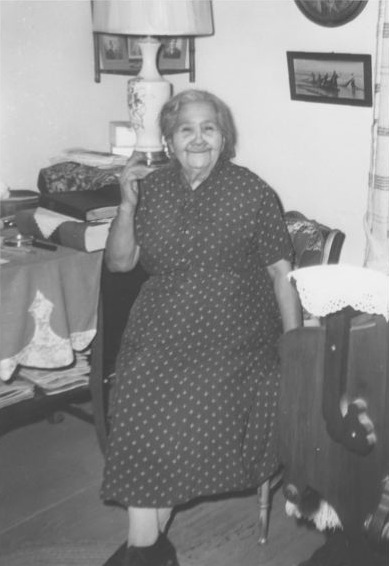
Born in 1881, Carrie Lodge was the granddaughter of Martina Castro Lodge. She was present for many events in Martina’s life, including Martina’s struggle to cope with an unsuccessful remarriage and losing her land, but Carrie also witnessed important events in Santa Cruz history, including fires that destroyed Santa Cruz’s Chinatown. Despite her formal education ending in the fifth-grade, Carrie persevered and learned stenography at Heald’s Business School in Oakland. She worked as the stenographer for the law offices of Partridge and Davidson in San Jose. Carrie was a skilled storyteller. She spoke about her father and mother’s journey to Hawaii, as well as her grandmother’s troubles and mental decline.

Audio Interview
Regional History Project
(1965)
Regional History Project
Carrie Electa Lodge in her living room, April 19, 1965.
© Regents of the University of California. Courtesy Special Collections, University Library, University of California Santa Cruz. Regional History Project Collection, The Martina Castro Lodge Family. Retrieved from https://escholarship.org/uc/item/27z9z18s.
“. . . the priests and the son-in-laws were fighting to force her to divide the land. Grandma couldn’t understand the language. It was turned over to another race and nation; she couldn’t do anything, see. Well, so it was taken out of her hands . . . . But you see, she didn’t know what was going on; she couldn’t understand, or she couldn’t tell in the language that they were speaking what she wanted, you know.”
“For all the ranches in the world I wouldn’t have gone through what she did. You have to be born to it. Yes, you have to be born to it. It was a hardship. You just can’t imagine the change that came with the American rule. You were taxed. Grandma never knew anything about taxation. She didn’t know English; it was all Spanish, and I don’t know if she even knew any French.”
“You know Papa thought the world of his father. His father had been a sailor and Papa took after him like a duck to water. You know when Papa was a boy he would perch on a cliff, and he’d know the name of every ship that passed. He pestered his mother to let him go as cabin boy. Oh he wanted to be a cabin boy, and she wouldn’t do it; she was scared she’d lose him. And then he finally annoyed his mother so much that she asked a certain friend to take him on. They were old friends because they traded with the family you know, in tallow and hides. They’d buy quarters of beef and sheep and a lot of that when they’d strike land you know. I guess that was in the days when they didn’t have so many things for the sailors. Anyway, she finally got that friend, and she told him to give Pa a hard time so it would cure him. And he did. And Papa to his dying day says that that was the meanest man he ever did know. He was the meanest man he ever came across; he didn’t like it at all.”
© Regents of the University of California. Courtesy Special Collections, University Library, University of California Santa Cruz. Audio detail from the Regional History Project Collection, The Martina Castro Lodge Family. Retrieved from https://escholarship.org/uc/item/27z9z18s.
The University of California’s Regional History Project documents the stories of Santa Cruzans since 1963. They continue with that work today. These stories not only document unique lives, but also tell a larger story about the life of agricultural and lumber laborers, business women, students, LGBTQIIA, and communities of color in Santa Cruz County. Listen to Santa Cruzans share their experiences in their own words. If you navigate to the MAH Do You Know My Name? virtual exhibit, you can further explore links to their stories and listen to the full interviews through the Regional History Project.
© Regents of the University of California. Courtesy Special Collections, University Library, University of California Santa Cruz. Regional History Project Collection. Retrieved from https://library.ucsc.edu/regional-history-project.